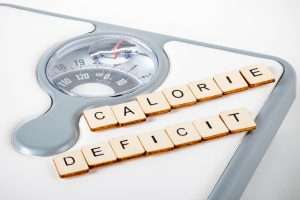Have you ever wondered why, despite following a strict calorie-deficit diet, you’re not seeing the weight loss results you expected? A calorie deficit is fundamental to weight loss, but there are often hidden factors and misunderstandings that can delay your progress. In this blog, we’ll dive into what a calorie deficit really means and its role in weight management, as well as explore the common mistakes and overlooked elements that could be holding you back.
What is a Calorie Deficit?
A calorie deficit is the state where you consume fewer calories than your body needs to maintain its current weight, leading to weight loss. It’s achieved by either eating less, exercising more, or a combination of both. This approach depends on the principle of energy balance: the calories you intake must be less than what your body expends. While effective for weight loss, it’s crucial to maintain a balance, as an excessive deficit can be counterproductive and unhealthy. Understanding and managing a calorie deficit wisely is key to successful and sustainable weight loss.
How Does a Calorie Deficit Work?
A calorie deficit works by creating an energy shortage in your body. When you consume fewer calories than what your body burns daily, it compensates by using stored fat for energy, leading to weight loss. This process depends on understanding your body’s energy needs, including basal metabolic rate and calories burned through physical activity. By consistently maintaining this deficit, your body gradually reduces fat stores, resulting in weight loss.
How to Calculate Your Calorie Deficit
To calculate your calorie deficit, first determine your daily caloric needs using factors like age, weight, height, and activity level. This gives you your maintenance calories – the number needed to maintain your current weight. A deficit is then created by consuming fewer calories than this number. A common approach is to reduce daily intake by 500 to 1000 calories to aim for a safe weight loss of 1-2 pounds per week.
Are Calorie Deficit Diets Effective?
Calorie-deficit diets are generally effective for weight loss, as they follow the basic principle of burning more calories than you consume. However, their effectiveness can vary based on individual factors like metabolism, lifestyle, and how well you follow the diet. Long-term success also depends on sustainable practices and healthy lifestyle changes beyond just dietary adjustments.
Why You Aren’t Losing Weight in a Calorie Deficit
It can be frustrating to follow a calorie-controlled diet and still not see weight loss results. This is often due to overlooked factors that impact your diet and body’s response. Let’s explore these elements to get a better understanding of why you aren’t losing weight even in a calorie deficit.
1. Underestimating How Many Calories You’re Taking In
One of the main reasons for stalled weight loss is misjudging the amount of calories consumed. It’s easy to overlook the calories in snacks, condiments, and beverages, which can add up and counteract your diet efforts.
2. Overestimating How Many Calories You’re Burning
Another common mistake is overestimating calorie burn during exercise. Fitness trackers and gym machines often provide inflated numbers, leading to a false sense of calorie deficit.
3. Metabolic Adaptations
As you lose weight, your body requires fewer calories to function. This metabolic adaptation can slow down weight loss, making it necessary to keep track of and adjust your calorie intake as you progress on your journey.
4. Inadequate Protein Intake
Protein is crucial for weight loss as it helps in building muscle and keeping you full. Not consuming enough protein can slow down muscle growth and lead to increased hunger, impacting your weight loss journey.
5. Lack of Fiber in Your Diet
Fiber plays a key role in weight management by enhancing fullness and regulating digestion. A diet low in fiber may lead to overeating and difficulties in maintaining a calorie deficit.
6. Inconsistent Eating Habits
Irregular eating patterns can disrupt your metabolism and lead to overeating. Consistency in meal timing and portion sizes is important for sustained weight loss.
7. Stress and Sleep Deprivation
Stress and lack of sleep can adversely affect your weight loss efforts. They increase cravings for unhealthy food and can disrupt hormonal balance, making it harder to lose weight.
8. Underlying Health Conditions
Certain health issues like thyroid disorders or hormonal imbalances can impede weight loss. Consulting a healthcare professional can help in identifying and addressing these conditions.
9. Plateauing
Reaching a weight loss plateau is common and occurs when your body adapts to your current diet and exercise routine. Changing your workout or dietary habits can help overcome this plateau.

Who to Talk to About Achieving Your Fitness Goals with a Calorie Deficit
Discussing your fitness goals and the role of a calorie deficit in achieving them is a vital step towards a successful and healthy weight loss journey. It involves understanding the science behind calorie deficits and effectively communicating your goals and concerns with professionals who can offer guidance and support. Being clear about your objectives and open to expert advice can significantly help with the effectiveness of your fitness plan.
Your Doctor
When talking to your doctor about your fitness goals with a calorie deficit, it’s important to be open and honest about your current health status, medical history, and any concerns you might have. Discuss your specific goals and ask for advice on how to achieve them through a calorie deficit safely. Your doctor can help assess the suitability of this approach for you, considering any health conditions or medications that may affect your weight loss journey. They can also monitor your progress and provide medical oversight to ensure your approach is safe and effective.
A Nutrition Coach
A conversation with a nutrition coach about using a calorie deficit to achieve fitness goals should focus on creating a personalized eating plan that aligns with your lifestyle, preferences, and nutritional needs. Share your past experiences with dieting, your typical eating habits, and any specific challenges you face in managing your diet. A nutrition coach can offer practical advice on how to create and maintain a calorie deficit, suggest healthy food choices, and provide ongoing support and accountability. They can also help you understand how to balance nutrient intake to optimize health and fitness outcomes while in a calorie deficit.
Nutrition Coaching in Scranton
If you’ve been struggling with seeing results on a calorie deficit, consider getting expert nutrition coaching at NEPA Fit Club. We offer personalized nutrition programs in Blakely, PA, that naturally fit into your lifestyle. Contact us today to schedule a consultation!
Summary
The key to achieving weight loss through a calorie deficit lies in understanding and addressing the various factors that influence your body’s response to a calorie-restricted diet. This includes accurately assessing your calorie intake and expenditure, considering metabolic changes, and taking your lifestyle into account. Every piece of this puzzle is essential for success. Armed with this knowledge and a customized strategy, you can overcome challenges and jump on your journey to sustainable, healthy weight loss.


